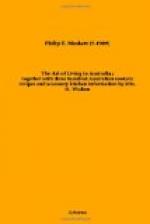But before leaving this matter I should like to refer briefly to the new markets in Flinders Street, Melbourne. They are called the City of Melbourne Meat, Fish, and Farm Produce Markets, and are most extensive in area. The viaduct which connects the two railway systems of Victoria pierces the very centre of these new markets. They are replete with every modern appliance for the storage and disposal of the food supply of a large city. There are numerous chambers for the frozen meat, and by means of what is called a “lock,” a whole train can be received into a long covered gallery. The two gates are then closed at either end, and the meat is thus received directly into the freezing chambers, without the slightest loss of any cold air. The fish and game are treated exactly in the same way, except that the receiving and delivery “locks” are not quite so large as in the former case. Still, there is just the same facility for their reception into the freezing chambers set apart for the purpose. The whole arrangements of these new fish markets are very perfect, and leave nothing to be desired.
THE “MIDDLEMAN” CONTROVERSY.
This is one of the topics which is continually cropping up in connection with the fishing industry in Australia. It is noteworthy, too, that the middleman in some shape or form appears to be part of the system of fish selling in every part of the world. At Billingsgate, where they are termed “bummarees,” it is stated that they fulfil a useful office in that they act as distributors to the small costermongers, who could hardly get along without them. The “bummarees” watch the market and speculate accordingly, and it must be urged for them that they run great risks from the unexpected arrival of a large amount of fish with a consequent glut in the market. But the “bummarees” pure and simple are comparatively few. Their ranks, however, are swelled in the following way: A salesman, having disposed of his own fish, will “bummaree” for the sake of the possible profit, or a fishmonger, having purchased a double supply for a cheaper price, will “bummaree” half his purchase. In France the procedure is different. First of all there is an agent termed an ecoreur, deputed by various persons and armed with purchasing power, who is ready to buy the fisherman’s catch at once. This simplifies matters wonderfully for the fisherman, who gets ready money and has no further bother. Next, from the ecoreur the fish is bought by the MOREYEUR, or trader, who despatches it to Paris and the other large cities. Thus, so far, the fish, after leaving the fisherman, has passed through two hands, those of the ecoreur, and those of the MOREYEUR. After this it has to face a most unjust tax—the octroi—by which all provisions are specially taxed before entering the “barriers” of any French city or town. Hence the initiated, when travelling in France, often




